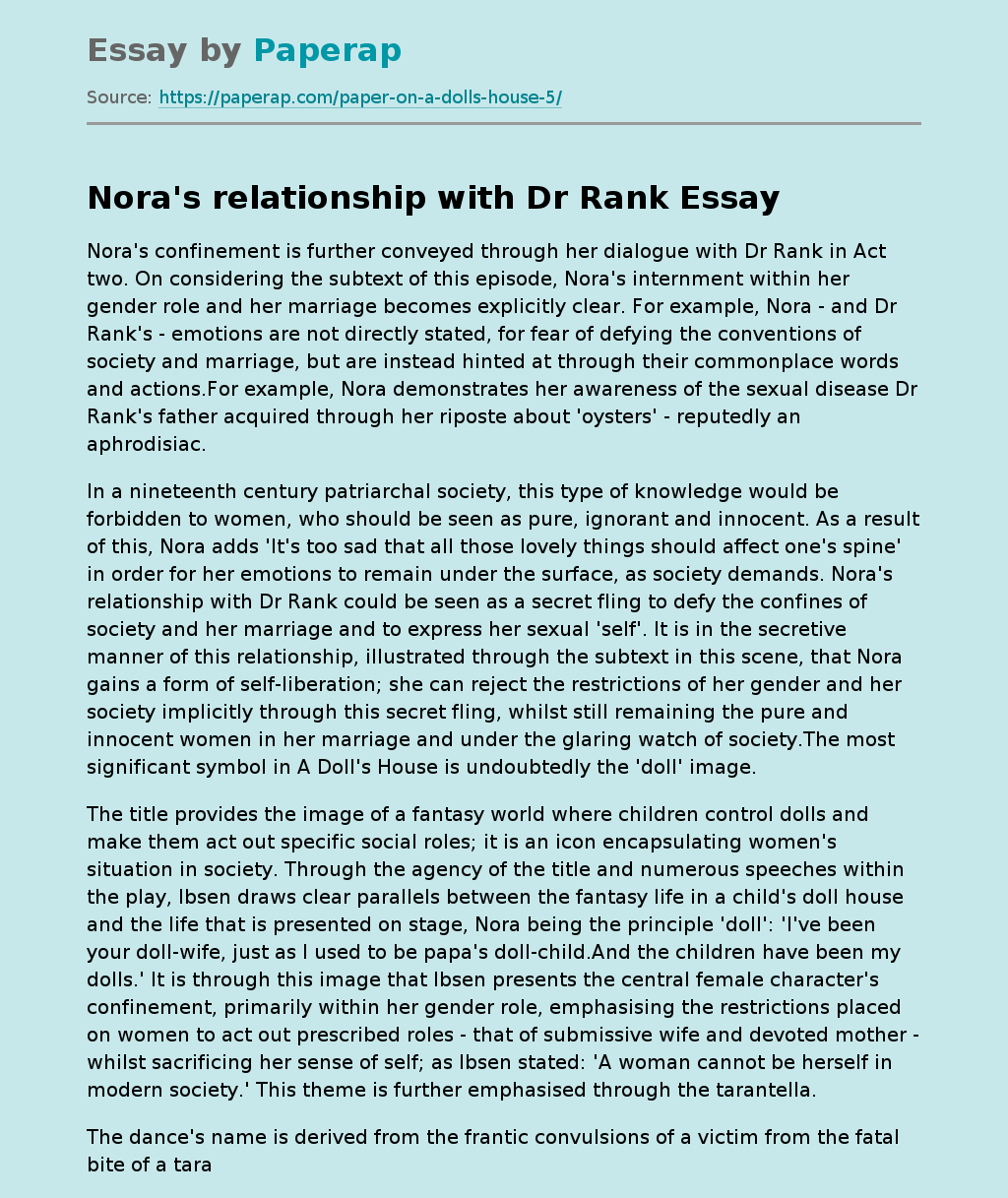Nora's relationship with Dr Rank
Nora’s confinement is further conveyed through her dialogue with Dr Rank in Act two. On considering the subtext of this episode, Nora’s internment within her gender role and her marriage becomes explicitly clear. For example, Nora – and Dr Rank’s – emotions are not directly stated, for fear of defying the conventions of society and marriage, but are instead hinted at through their commonplace words and actions.For example, Nora demonstrates her awareness of the sexual disease Dr Rank’s father acquired through her riposte about ‘oysters’ – reputedly an aphrodisiac.
In a nineteenth century patriarchal society, this type of knowledge would be forbidden to women, who should be seen as pure, ignorant and innocent. As a result of this, Nora adds ‘It’s too sad that all those lovely things should affect one’s spine’ in order for her emotions to remain under the surface, as society demands. Nora’s relationship with Dr Rank could be seen as a secret fling to defy the confines of society and her marriage and to express her sexual ‘self’.
It is in the secretive manner of this relationship, illustrated through the subtext in this scene, that Nora gains a form of self-liberation; she can reject the restrictions of her gender and her society implicitly through this secret fling, whilst still remaining the pure and innocent women in her marriage and under the glaring watch of society.The most significant symbol in A Doll’s House is undoubtedly the ‘doll’ image.
The title provides the image of a fantasy world where children control dolls and make them act out specific social roles; it is an icon encapsulating women’s situation in society.
Through the agency of the title and numerous speeches within the play, Ibsen draws clear parallels between the fantasy life in a child’s doll house and the life that is presented on stage, Nora being the principle ‘doll’: ‘I’ve been your doll-wife, just as I used to be papa’s doll-child.And the children have been my dolls.’ It is through this image that Ibsen presents the central female character’s confinement, primarily within her gender role, emphasising the restrictions placed on women to act out prescribed roles – that of submissive wife and devoted mother – whilst sacrificing her sense of self; as Ibsen stated: ‘A woman cannot be herself in modern society.’ This theme is further emphasised through the tarantella.
The dance’s name is derived from the frantic convulsions of a victim from the fatal bite of a tarantula, effectively depicting the essence of Nora’s situation; society will prove fatal to her true ‘self’ if not confronted.It could be argued that the tarantella represents Nora trying to defy the confines of her gender role by expressing her sexual ‘self’. It is notable that in the rehearsal of the dance, Nora is under the strict authority of Torvald, who controls her every move, and Dr Rank, who provides the music. The patriarchal rule is emphasised here when Torvald orders her to dance ‘slower!’ and ‘not so violently’, inhibiting her mode of personal expression. In the final performance of the tarantella, Nora is required to were a costume; that of a Neapolitan fisher-girl that Torvald chose, as a sort of misogynistic fantasy.
It appears that Ibsen is suggesting that, in a patriarchal society, ‘femininity’ involves playing a series of roles that require the disguising of the ‘self’.The powerful denouement of A Doll’s House provides the platform for Nora’s self-liberation. Nora’s eventual realisation of her ‘doll’ role could be termed as an anagnorisis, or a moment of illumination. This is illustrated particularly well when Nora ‘[takes] off [her] fancy dress’, a metaphor for abandoning the disguise of her true identity, and declares her transformation: ‘Yes, Torvald. I’ve changed.’ In doing so, Nora neglects her ‘most sacred duties…towards [her] husband and [her] children’ to concentrate on herself: ‘I believe that I am first and foremost a human being.’ In rejecting her ‘doll’ role, she is perfectly aware that she will become a social outcast but has concluded that she needs to ‘educate’ herself to who she really is and adopt her own opinions: ‘I must try to satisfy myself which is right, society or I’.Upon slamming the door, Nora rejects the constraints society has imposed on her in order to realise her full potential as an individual in the outside world, therefore claiming her humanity. Her refusal to mould into the self-sacrificial role of wife and mother equates to a rejection of Hegel’s theory of women’s role in the family and society. Her quest for self-realisation is emblematic of women’s struggle for social and political rights, and Ibsen implies that the conventions of society would have to change in order for women to prosper in modern society; the ‘miracle’.
Nora's relationship with Dr Rank. (2017, Aug 23). Retrieved from https://paperap.com/paper-on-a-dolls-house-5/

